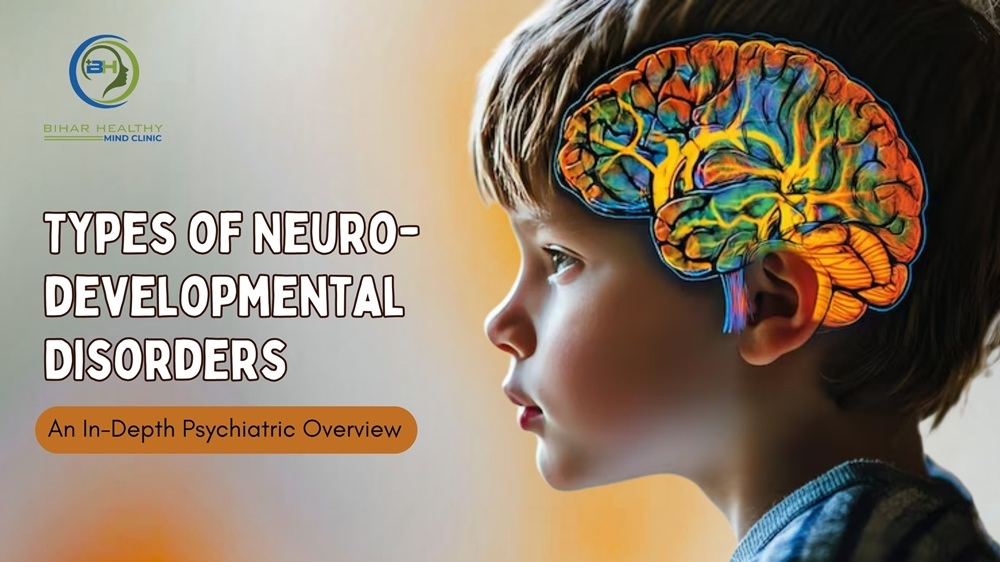
Neurodevelopmental disorders comprise conditions that emerge during early stages of development, often appearing before a child starts primary education. They affect the brain’s growth and function, influencing learning, behavior, social interaction, and communication. Understanding neurodevelopmental meaning, causes, and classifications is essential for early intervention and effective management.
At Patna Psychiatry, under the guidance of Dr. Saurabh Kumar, MD (Psychiatry), recognized as the best child psychiatrist in Patna, patients receive comprehensive, evidence-based treatment tailored to their specific needs. This article explains what is a neurodevelopmental disorder, defines it in psychiatric terms, and elaborates on the major types to enhance awareness among patients, caregivers, and healthcare seekers.
Neurodevelopmental Meaning in Psychiatry
In psychiatry, neurodevelopmental disorders refer to impairments in the growth and development of the brain or central nervous system. These disorders often manifest in early childhood and may continue into adulthood, affecting cognitive, emotional, social, and motor functions.
To define neurodevelopmental disorder clinically: it is a condition characterized by developmental deficits that produce impairments in personal, social, academic, or occupational functioning. These impairments result from variations in brain structure or function, influenced by genetic, environmental, or prenatal factors.
What is a Neurodevelopmental Disorder?
From a psychiatric standpoint, what is a neurodevelopmental disorder is best understood as a lifelong condition that influences how a person thinks, learns, behaves, and interacts with others. Although symptoms can be managed with therapy, medication, and supportive interventions, early diagnosis significantly improves outcomes.
Types of Neurodevelopmental Disorders
Here are the major categories recognized in psychiatric practice:
1. Autism Spectrum Disorder (ASD)
ASD is a complex condition characterized by difficulties in social interaction, verbal and non-verbal communication, and repetitive behaviors. Symptoms vary in severity, hence the term “spectrum.” Early intervention with behavioral therapy can lead to significant improvement.
2. Attention-Deficit/Hyperactivity Disorder (ADHD)
ADHD is marked by ongoing patterns of distractibility, excessive activity, and impulsive behavior. Young individuals with ADHD often encounter difficulties in school, whereas adults may experience problems in their work life. A combination of behavioral strategies and medication often yields the best results.
3. Intellectual Developmental Disorder (IDD)
Once known as intellectual disability, IDD is characterized by diminished cognitive abilities and difficulties in adaptive functioning. Educational support combined with life-skill development plays a crucial role in enhancing overall quality of life.
4. Communication Disorders
These include language disorder, speech sound disorder, childhood-onset fluency disorder (stuttering), and social communication disorder. Such conditions hinder the ability to express or understand language effectively.
5. Specific Learning Disorders
This category covers difficulties in reading (dyslexia), writing (dysgraphia), or mathematics (dyscalculia). Despite normal intelligence, individuals face significant academic challenges without targeted interventions.
6. Motor Disorders
Disorders like developmental coordination disorder, stereotypic movement disorder, and tic disorders (including Tourette syndrome) impair motor coordination and control over body movements. Occupational therapy plays a vital role in management.
7. Genetic Syndromes Associated with Neurodevelopmental Challenges
Certain genetic conditions such as Down syndrome, Fragile X syndrome, and Rett syndrome fall under this category. They involve distinct developmental delays and require multidisciplinary care.
Causes and Risk Factors
-
The underlying causes of neurodevelopmental disorders are varied and arise from multiple contributing factors, including:
- Genetic factors: Mutations, chromosomal abnormalities, and hereditary patterns.
- Prenatal influences: Maternal infections, substance exposure, or malnutrition during pregnancy.
- Perinatal factors: It includes issues such as complications during birth, early delivery, or reduced birth weight.
- Environmental triggers: Lead exposure, neglect, or early childhood trauma.
Diagnosis and Assessment
Psychiatrists use a combination of clinical evaluation, developmental history, standardized assessments, and neuropsychological testing to confirm diagnosis. In many cases, input from psychologists, speech therapists, and occupational therapists is essential.
At Patna Psychiatry, Dr. Saurabh Kumar adopts a holistic approach, ensuring that each patient receives a personalized treatment plan based on detailed assessment.
Treatment Approaches
-
While neurodevelopmental disorders may not be curable, their impact can be reduced through:
- Behavioral interventions (Applied Behavior Analysis, social skills training)
- Educational support (special education programs, individualized learning plans)
- Speech and language therapy
- Occupational therapy
- Medication (in selected cases like ADHD or severe anxiety)
- Parent and caregiver counseling
Living with Neurodevelopmental Disorders
A diagnosis can feel overwhelming for families, but with appropriate care, individuals can thrive academically, socially, and emotionally. Support groups, ongoing therapy, and regular psychiatric follow-ups play an important role in long-term success.
Why Choose Patna Psychiatry?
When searching for the best psychiatrist in Patna for neurodevelopmental concerns, Patna Psychiatry stands out for its patient-focused care, ethical treatment practices, and expertise in complex psychiatric conditions. Under Dr. Saurabh Kumar’s guidance, the clinic ensures that every patient receives compassionate and evidence-based support.
Conclusion
Understanding the types of neurodevelopmental disorders and their psychiatric implications is the first step toward timely diagnosis and effective management. With the right combination of therapy, medical care, and support, individuals with these conditions can lead fulfilling lives.
If you or a loved one is experiencing developmental challenges, early consultation with a qualified psychiatrist can make all the difference. Patna Psychiatry remains committed to delivering exceptional care in this field.
Disclaimer: All characters and events depicted in this blog are entirely fictional. Any resemblance to actual persons, living or dead, is purely coincidental. The content is intended for informational purposes only and should not be considered as medical advice. Always consult a qualified healthcare professional for medical concerns.
Visitors: 120





No comments yet.